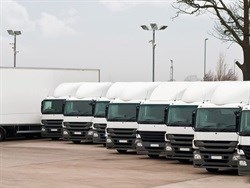According to a recent report by ABI Research, it is expected that worldwide revenues in the commercial fleet telematics market will increase from $7.25bn in 2012 to $26.8bn in 2018.
The bulk of this projected global growth is expected to be in the US, with Asia and the Middle East a close second. As tighter trucking regulations drive the adoption of technology, the US telematics market increases are estimated at a 15.3% compound annual growth rate over the next four years.
Numbers out of the US indicate that these crystal ball predictions may not simply be hype. Buoyed by both innovation and investment - the two key drivers in any market - the US automotive industry looks to be singing all the right notes.
Firstly, in an analysis of global patent applications released this week, Hyundai posted the biggest gains in the number of patent filings over the past five years, closing the gap on industry leader Toyota.
Rental fleet purchases
In addition, 2014 rental fleet purchases were the highest since 2007, according to Manheim's annual Used Car Market Report. US rental car companies bought 1.63 million new vehicles in 2014, an almost 4% increase on the year before, albeit well below the 2.1 million new vehicles that were sold into rental fleets in 2005 and 2006.
In South Africa, commercial telematics is expected to take a somewhat less meteoric, but no less significant, uptake with penetration reaching 22.5% by 2021 and generating R4.6bn.
"We expect the fleet and commercial telematics market to be propelled by increased competition in the local logistics market, erratic fuel costs and the drive towards wireless connectivity in all areas of business," says Mike van Wyngaardt, executive at Tracker Business.
A 2015 Telogis report looking at the convergence of technology and business management identified key trends pertaining to fleet management for the year.
Customer expectations
According to the report customer expectations will continue to evolve: "An increasing percentage of a mobile enterprise's customers will expect more - more accurate ETAs, online real-time tracking of their service request, flexibility in meeting change requests or strict time windows, faster deliveries - and they'll want to be able to rely on one partner to handle it in one central location. The ability to avoid multiple logins and a number of different point solutions will become even more important for efficiency and productivity and overall visibility. All of these changes will affect delivery."
While the report covers the US market, these characteristics overlay most economies of today - with nowhere to hide from tech adoption - and South Africa's developed telematics market is no exception.
"Advancements in vehicle fleet intelligence hold the potential to impact other areas of business. Yes, we see the impact of increased transparency and verification on performance, safety, efficiency and improved control of business processes. But, the connected fleet of today could provide the blueprint for the connected business of tomorrow. That's going to be very interesting to watch over the next year or so," says Van Wyngaardt.




































